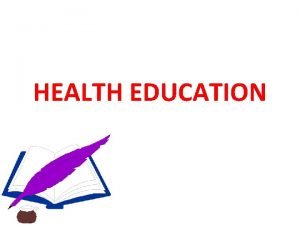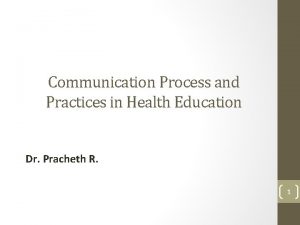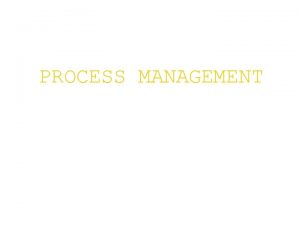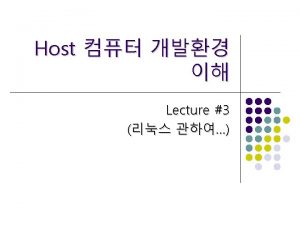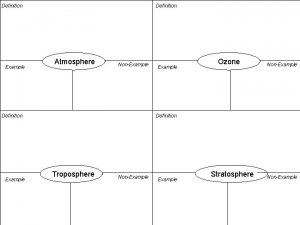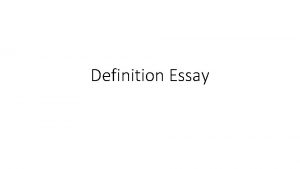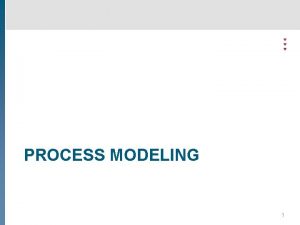HEALTH EDUCATION Definition Health education is the process



















- Slides: 19

HEALTH EDUCATION


Definition “Health education is the process by which individuals and group of people learn to “: • Promote • Maintain • Restore health. “Education for health begins with people as they are, with whatever interests they may have in improving their living conditions”.

Health Education Definition - WHO • Process of providing information and advice related to healthy lifestyle and encouraging the development of knowledge, attitudes and skills aimed at behaviour change of individuals or communities. • Enables and influences controll over own´s health leading to optimalization of attitudes and habits related to lifestyle and increasing quality of life.

Health Education/Health Promotion • ‘Texting While Driving’ • What message is being put across? • Where have you seen it before today? • Who is it aimed at? • Do you think it will change peoples’ behaviour? Why? /Why not?

What is Health Education? • Educating people to have healthier lifestyles so they can AVOID disease • Health Education aims to: - inform people through knowledge - change unhealthy attitudes - change unhealthy behaviours • Its REALLY difficult to get people to change their attitudes and behaviour!

Historical Development • When did health education become a concern? • Research: - WHO’s Health for All By the Year 2000 - Alma-Ata Declaration 1978 - Ottawa Charter for Health Promotion 1986 - The Black Report 1980 - Inequalities in Health: The Black Report & the Health Divide (1987)

Health education or Health Promotion? “Any combination of learning experiences designed to facilitate voluntary adaptation of behavior conducive to health”. - All possible channels of influence on health are appropriately combined and designed to support adaptation of behavior. - The word “voluntary” is significant for ethical reasons.

Educators should not force people to do what they don’t want to do. i. e. All efforts should be done to help people make decisions and have their own choices. - The word “designed” refers to planned, integral, intended activities rather than casual, incident, trivial experiences.

Health education or Health Promotion? • With rising criticism that traditional H. E. was too narrow, focused on individual’s lifestyle and could become “victim blaming”, more work was done about wider issues e. g. , social policy, environmental safety measures (Emergence of Health Promotion)

Health Promotion: A widely used term to encompass various activities e. g. : Ø Behavior & lifestyle, Ø Preventive health services, Ø Health protection directed at environment, Ø Health related public policy, Ø Economic & regulatory measures. (Health Education is the primary and dominant measure in Health Promotion )

Aims of Health Education 1. To develop a sense of responsibility for health conditions, as individuals, as members of families & communities. (Promotion, prevention of disease & early diagnosis and management ). 2. To promote and wisely use the available health services. 3. To be part of all education, and to continue throughout whole span of life.

Process of Health Education • Dissemination of scientific knowledge (about how to promote and maintain health), leads to changes in KAP related to such changes.

Steps for Adopting New Ideas & Practices • Awareness (Know about new ideas) • Interest (Seeks more details ) • Evaluation (Advantages versus disadvantages + testing usefulness ) • Trial • (Decision put into practice) Adoption (person feels new idea is good and adopts it)

Contents of Health Education Nutrition Health habits Personal hygiene Safety rules Basic (K) of disease & preventive measures Mental health Proper use of health services Sex education Special education for groups( food handlers, occupations, mothers, school health etc. ) • Principles of healthy life style e. g. sleep, exercise • • •

Principles of Health Education Interest Participation Motivation Comprehension Proceeding from the known to the unknown • Reinforcement through repetition • Good human relations • People, facts and media: • • • “knowledgeable, attractive , acceptable “.

Principles of Health Education • Learning by doing: “ If I hear, I forget If I see, I remember If I do, I know”. • Motivation, i. e. awakening the desire to know and learn: - Primary motives, e. g. inborn desires , hunger, sex. - Secondary motives, i. e. desires created by incentives such as praise, love, recognition, competition.

Communication in Health Education • Education is primarily a matter of communication, the components of which are: CHANNELS AUDIENCE MESSAGE COMMUNICATOR - Individual - Conform with - Educator - Media - Group objectives. --------------------------------------------- 2 way - Public - understandable - 1 way - Public - Acceptable - needs+ interest of audience --------------------------------------------- ? Content of message ---------------------------------------------

 Who health education definition
Who health education definition Communication process in health education
Communication process in health education Hình ảnh bộ gõ cơ thể búng tay
Hình ảnh bộ gõ cơ thể búng tay Ng-html
Ng-html Bổ thể
Bổ thể Tỉ lệ cơ thể trẻ em
Tỉ lệ cơ thể trẻ em Gấu đi như thế nào
Gấu đi như thế nào Tư thế worm breton
Tư thế worm breton Alleluia hat len nguoi oi
Alleluia hat len nguoi oi Các môn thể thao bắt đầu bằng tiếng bóng
Các môn thể thao bắt đầu bằng tiếng bóng Thế nào là hệ số cao nhất
Thế nào là hệ số cao nhất Các châu lục và đại dương trên thế giới
Các châu lục và đại dương trên thế giới Cong thức tính động năng
Cong thức tính động năng Trời xanh đây là của chúng ta thể thơ
Trời xanh đây là của chúng ta thể thơ Mật thư tọa độ 5x5
Mật thư tọa độ 5x5 101012 bằng
101012 bằng Phản ứng thế ankan
Phản ứng thế ankan Các châu lục và đại dương trên thế giới
Các châu lục và đại dương trên thế giới Thơ thất ngôn tứ tuyệt đường luật
Thơ thất ngôn tứ tuyệt đường luật Quá trình desamine hóa có thể tạo ra
Quá trình desamine hóa có thể tạo ra
